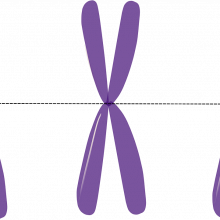Listener Mattie asked "If humans have too many or too few chromosomes it can cause them to be infertile. So how did different creatures get different numbers of them? For example, humans have 46 chromosomes, but mice have 40." Eva Higginbotham asked genome evolution expert Hugues Roest Crollius...
In this episode

- QotW: Different species' chromosome numbers
QotW: Different species' chromosome numbers
Eva - It’s an interesting question - how did changes in chromosome number ever occur if they can cause the individual to not be able to breed to pass on those changes to the next generation?! I put the question to Hugues Roest Crollius, he’s an expert in genome evolution at an institute in Paris...
Hugues - It is true that in humans, the number of chromosomes is 46 and any change can lead to adverse effects, such as in the case of Down syndrome caused by an extra chromosome 21. However, during evolution, chromosomes slowly evolve and exchange pieces and they can also fuse or break.
Eva - These changes can happen due to mistakes during meiosis - the genetic process by which we divide up our DNA to make eggs and sperm. Importantly, not all mutations in chromosome number result in infertility - as long as the chromosomes haven’t changed so much that you can’t make any viable eggs and sperm anymore. In fact, it’s these changes that can trigger the formation of a new species.
Hugues - Because of the fusions and breaks, the total number of chromosomes can change between species: two chromosomes can fuse to become one, for example. Starting from a common ancestor, after millions of years of this process, two species can end up having very different numbers of chromosomes. For example the ancestor of placental mammals lived about 100 million years ago, and we think that it had 46 chromosomes. Today, one of its descendants, the Indian Muntjac, a species of deer, has only 6 chromosomes, while dogs, another descendant, have 78!
Eva - In fact, scientists think that it was a fusion of ancestral chromosomes that created the human chromosome 2, and that this could have been an important part of separating us as a species from our close relatives the chimps, apes, and orangutans, who all have 24 pairs of chromosomes to our 23.
Hugues - The chromosome number can therefore vary quite widely, and ultimately, it’s just not so important. What’s actually important is the total number of genes that they carry. All mammals, humans, mice, dogs and indian muntjacs included, have about 20.000 genes on their chromosomes. The many small dog chromosomes carry few genes each, while the few large indian muntjac chromosomes carry lots of genes, meaning that they both have about 20.000 in total. This number of genes is important to carry out all the important functions required for the typical mammalian organism.
Eva - Given this, it is easier to understand why an extra chromosome 21 causes Down syndrome: it is not so much the extra chromosome by itself, it is all the extra genes that it carries that cause the disease. And importantly, about 30-50% of women with Down’s syndrome are fertile, and some men with Down’s syndrome have fathered children too.
Thanks Hugues! Next week, we’ll be looking into this question from Nancy
Nancy - Why does chilli stay on your fingers for so long after cooking with them, even after you wash your hands multiple times it can still hurt if you touch your eyes!










Comments
Add a comment